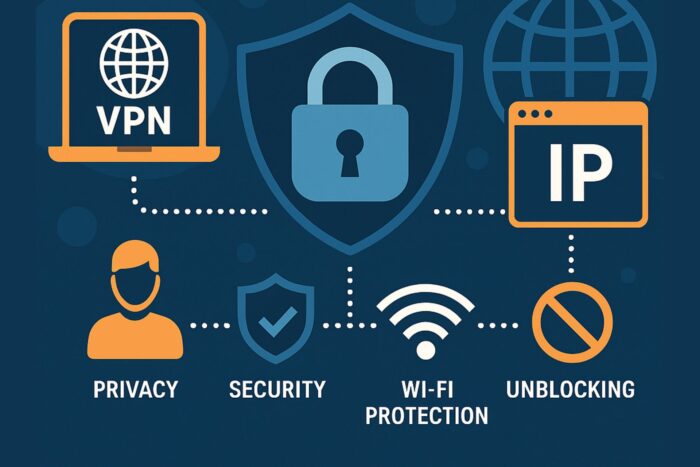VPNs provide multiple advantages. First and foremost, they encrypt any data you send and receive online, making it very difficult for cybercriminals to intercept and gain access to sensitive information like passwords, credit card numbers, and social security numbers.
VPNs also cloak your IP address, making it more difficult for others to determine your location on the web. This feature can be particularly helpful in countries that impose restrictive internet censorship regulations.
Encryption
With a VPN, data is encrypted so it cannot be seen by anyone other than the device you are using, making it harder for hackers to steal your browsing history or other personal details, while simultaneously increasing security when accessing public Wi-Fi networks.
VPNs can help protect against phishing attacks by masking your identity, making it harder for cybercriminals to track your activity online and sell any of your information. However, VPNs alone cannot offer complete protection and should always be combined with an antivirus program for optimal protection.
Businesses often turn to VPNs as a tool for remote access and independence from countries with restrictive Internet laws, as well as to enhance security and reduce the total cost of ownership for network protection technologies.
VPNs allow remote employees to work from home securely, which is especially beneficial in times of pandemic or other emergency. Through virtual private network tunnels, remote employees can securely and reliably connect to their company systems regardless of their physical location; additionally, these VPNs encrypt messages between client and server to prevent third parties from spying on data transmission while also providing companies with remote employee monitoring capability.
Hiding your IP address
Use of a VPN is one of the best ways to conceal your IP address online. Your IP address identifies where you are online but can easily be tracked by hackers; by scrambling your data into nonsensical text and characters that cannot be read, VPNs help protect against this by rendering any attempts by third parties to intercept it unreadable and useless.
Quality VPN services use industry-standard 256-bit encryption and offer multiple protocols to provide maximum protection. In addition, make sure they don’t log or share your data with third parties—as ISPs and other entities become ever more adept at tracking.
As well as providing data encryption, a good VPN will also mask your public IP address to keep users from being tracked on the web, particularly when accessing unsecured Wi-Fi networks. This can prevent cybercriminals from tracking online activity and stealing personal information.
VPNs allow you to spoof your location, making it possible to access content that may otherwise be blocked in your country. Most VPN apps have easy ways for you to activate and deactivate this feature with just the flick of a switch; additionally, you can choose different server locations if necessary.
Avoiding data throttling
VPNs encrypt your data so ISPs cannot see what you’re doing online, preventing them from throttling your internet speed based on certain activities. But they cannot prevent bandwidth caps or other restrictions being placed upon you by your ISP; to avoid throttling altogether, closely monitor data usage while shopping around for an ISP with better plans and services.
Reliable VPN services provide protection from both doxing, in which sensitive personal information like your credit card number and location is published online without your knowledge, as well as DDoS attacks by hackers who launch massive attacks against websites and services online. A good provider will use strong encryption techniques and multiple authentication methods, including multi-factor authentication, to safeguard the security of your connection.
When searching for a VPN provider, ensure it offers servers in multiple global locations to reduce data travel time and improve performance. NordVPN boasts over 5,400 servers located in 60 countries, making it easy to find one near you with high-speed connections ideal for streaming video and other ISP-throttled activities, as well as offering numerous features like money-back guarantees and excellent customer support teams—making NordVPN one of the leading choices out there today!
Accessing blocked websites
Government censorship and surveillance in many regions restrict which websites people can visit and services they use online; VPNs offer an avenue around these restrictions by masking your location.
When you connect to a VPN server, your data flows through an encrypted tunnel that only the provider can access; once there, it becomes encoded with code incomprehensible to anyone without their encryption key and then sent off as new IP addresses to its destination website.
VPNs can also help prevent bandwidth throttling by masking all data going to and from your device, thus preventing internet service providers from slowing your connection down when downloading or streaming videos or other media content.
When it comes to selecting a VPN service provider, look for one with multiple features and services available. Preferably one that offers worldwide servers with fast performance and one with a no-logs policy and user-friendly apps across devices, as well as multi-factor authentication and other security measures for added protection, like anti-virus software and ad-blocking features, are desirable features.

